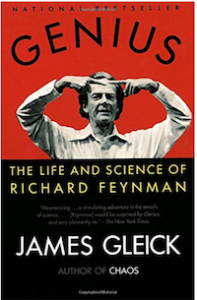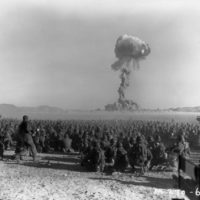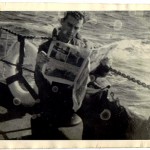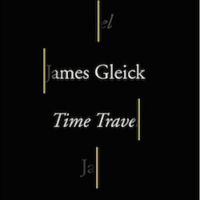- Chaos: Making A New Science (James Gleick)
- Technocracy In America: Rise of the Info-State (Parag Khanna)
- Genius: The Life and Science of Richard Feynman (James Gleick)
- The Tao of Physics: An Exploration of the Parallels Between Modern Physics and Eastern Mysticism (Fritjof Capra)
- From Bacteria to Bach: The Evolutions of Minds (Daniel Dennett)
- Homo Deus: A Brief History of Tomorrow (Yuval Noah Harari)
- Isaac Newton (James Gleick)
- Why Buddhism is True: The Science and Philosophy of Meditation and Enlightenment (Robin Wright)
- WTF? What’s the Future and Why It’s Up to Us (Tim O’Reilly)
- Engines of Change: A History of the American Dream (Paul Ingrassia)
- Breaking the Spell: Religion As A Natural Phenomenon (Daniel Dennett)
Tag Archives: Richard Feynman
Everything is exactly the same
“Everything is made of some other thing. And those things in turn are made of other things. Over the next hundred years, scientists will uncover layer after layer of building blocks, each smaller than the last. At each layer the differences between types of matter will be fewer. At the lowest layer everything is exactly the same. Matter is uniform. Those are the bits of God.”
— God’s Debris by Scott Adams
“Matter is incredibly, mind-bogglingly empty. An atom is like a miniature Solar System, with a tight nucleus playing the role of a Sun orbited by electrons like planets. But the nucleus is incredibly tiny compared with the orbits of the electrons. Tom Stoppard, the playwright, had the best image. He said, if the nucleus is like the altar of St Paul’s cathedral, an electron is like a moth in the cathedral, one moment by the altar, the next by the dome. Imagine squeezing all the space out of an atom. Well, if you did that to all the atoms in all the people in the world, you could indeed fit the entire human race in the volume of a sugar cube.” — Physics.org
A few months ago I read James Gleick’s biography of Richard Feynman (Genius: The Life and Science of Richard Feynman). Lots of math and physics (all way over my head, but fascinating nonetheless) and a deep-dive into particle physics, at least for me. My simplistic take-away: 1) Matter and energy are the same thing. Sometimes. 2) Everything is made of this energy/matter. Everything. My hat. My body. Donald Trump. All made of the same stuff.
It would be difficult to get through the day if we experienced reality at this sub-atomic level so our brains (consciousness?) process it in a way that won’t make our heads explode. Nevertheless, I find it comforting to think of it in this way. Little bits of god or the Universe or whatever… winking in and out of existence.
Genius: The Life and Science of Richard Feynman
 “You see, one thing is, I can live with doubt and uncertainty and not knowing. I think it’s much more interesting to live not knowing than to have answers which might be wrong. I have approximate answers and possible beliefs and different degrees of certainty about different things, but I’m not absolutely sure of anything and there are many things I don’t know anything about, such as whether it means anything to ask why we’re here. . . I don’t have to know an answer. I don’t feel frightened by not knowing things, by being lost in a mysterious universe without any purpose, which is the way it really is as far as I can tell. It doesn’t frighten me.”
“You see, one thing is, I can live with doubt and uncertainty and not knowing. I think it’s much more interesting to live not knowing than to have answers which might be wrong. I have approximate answers and possible beliefs and different degrees of certainty about different things, but I’m not absolutely sure of anything and there are many things I don’t know anything about, such as whether it means anything to ask why we’re here. . . I don’t have to know an answer. I don’t feel frightened by not knowing things, by being lost in a mysterious universe without any purpose, which is the way it really is as far as I can tell. It doesn’t frighten me.”
— Richard Feynman
Am I alive because of the atomic bomb?
 I’m about halfway through Genius, James Gleick’s biography of Richard Feynman, considered by many the most brilliant American physicist of the 20th century. Feynman was probably the smartest of the scientists working on the Trinity Project (America’s atom bomb program). The first (and only test) of the bomb took place July 16, 1945. American bombers nuked the Japanese cities of Hiroshima and Nagasaki a few weeks later (Aug 6-9). Japan surrendered on August 15, 1945.
I’m about halfway through Genius, James Gleick’s biography of Richard Feynman, considered by many the most brilliant American physicist of the 20th century. Feynman was probably the smartest of the scientists working on the Trinity Project (America’s atom bomb program). The first (and only test) of the bomb took place July 16, 1945. American bombers nuked the Japanese cities of Hiroshima and Nagasaki a few weeks later (Aug 6-9). Japan surrendered on August 15, 1945.
My father was in the Navy from May, 1943 until March 9, 1946. He served on the USS Mount McKinley; USS Appalachian; USS New Jersey; USS War Hawk; USS Iowa; and one or two others. All of which saw action in the Pacific.
 According to Gleick, building the atomic bomb dramatically affected the lives of the scientists who created it. The Japanese lives lost to this terrible weapon have always been balanced against those that would have been lost in an invasion of Japan. Like my father, for instance. Japan surrenders, they turn the ships around and head home. Discharged March 9, 1946 in St. Louis. Meets and marries my mom (March 23, 1946) who was living in St. Louis. Happy ending. For some.
According to Gleick, building the atomic bomb dramatically affected the lives of the scientists who created it. The Japanese lives lost to this terrible weapon have always been balanced against those that would have been lost in an invasion of Japan. Like my father, for instance. Japan surrenders, they turn the ships around and head home. Discharged March 9, 1946 in St. Louis. Meets and marries my mom (March 23, 1946) who was living in St. Louis. Happy ending. For some.
I’ve been sitting here for a few minutes trying to boil down some meaning from this bit of history. But “what if this event hadn’t happened” is a pointless game. It did happen.
“Nothing can happen unless the entire universe makes it happen. A thing is as it is, because the universe is as it is.”
Time Travel: A History (James Gleick)
 “From the acclaimed author of The Information and Chaos, here is a mind-bending exploration of time travel: its subversive origins, its evolution in literature and science, and its influence on understanding time itself.”
“From the acclaimed author of The Information and Chaos, here is a mind-bending exploration of time travel: its subversive origins, its evolution in literature and science, and its influence on understanding time itself.”
Sleeping into the future is what we do every night.
“Man can do what he will, but he cannot will what he wills.” — Arthur Schopenhauer
“People living in different countries kill each other at irregular time intervals, so that also for this reason anyone who thinks about the future must live in fear and terror. I trust that posterity will read these statements with a feeling of proud and justified superiority.” — Albert Einstein’s message in the time capsule buried at the 1939 New York World’s Fair
We know that complete certainty must always elude us. We know that for certain.
“Time and space are modes by which we think, and not conditions in which we live.” — Albert Einstein
“I have approximate answers and possible beliefs and different degrees of certainty about different things, but I am not absolutely sure of anything.” — Richard Feynman
What is time? Things change, and time is how we keep track.
Schopenhauer asserted that life and dreams are pages from the same book. To read them in their proper order is to live, but to browse among them is to dream.
No one can really explain how memories are formed and retrieved. Nor can anyone explain away Proust’s paradoxical contention: that the past cannot truly be recovered by searching our memories, by interrogating them, by rewinding the film or reaching back into the drawer; rather, that the essence of the past, when it comes to us at all,comes unbidden.
If you ever see yourself coming out of a time machine, run the other way as fast as you can. Nothing good can come from meeting yourself. — Charles Yu
We experience childhood one way when we’re living it and another way when we relive it in memory.
But if memory is the action of recollection, the act of remembrance, then it implies an ability to hold in the mind two constructs, one representing the present and another representing the past, and to compare them, one against the other. How did we learn to distinguish memory from experience?
Our conscious brains invent the concept of time over and over again, inferring it from memory and extrapolating from change. And time is indispensable to our awareness of self. […] You order the slices of your life. You edit the film even as it records.
“There were buttons and switches everywhere—buttons to call for food, for music, for clothing. There was the hot-bath button, by pressure of which a basin of (imitation) marble rose out of the floor, filled to the brim with a warm deodorized liquid. There was the cold-bath button. There was the button that produced literature, and there were of course the buttons by which she communicated with her friends. The room, though it contained nothing, was in touch with all that she cared for in the world.” — The Machine Stops by E. M. Forster
Why do we need time travel, when we already travel through space so far and fast? For history. For mystery. For nostalgia. For hope. To examine our potential and explore our memories. To counter regret for the life we lived, the only life, one dimension, beginning to end.
“We know it all now, with our thoughts travelling at the speed of tweet. We are time travelers into our own future. We are Time Lords.” — Ali Smith
If we confuse the real world with our many virtual worlds, it’s because so much of the real world is virtual.
Time’s winged chariot isn’t taking us anywhere good. […] The past, in which we did not exist, is bearable, but the future, in which we will not exist, troubles us more.
“We perceive time only because we know we have to die.” — Heidegger
